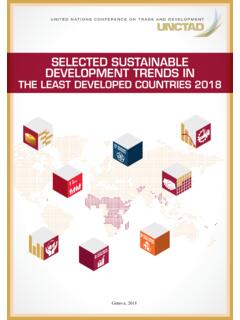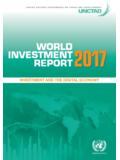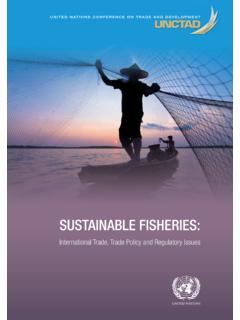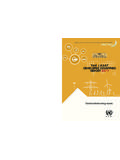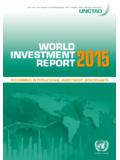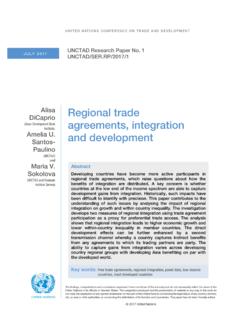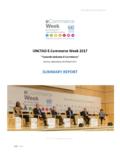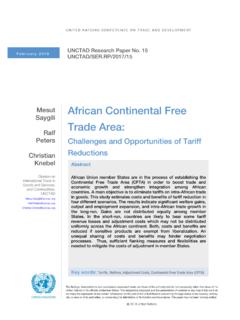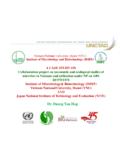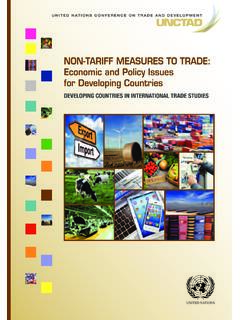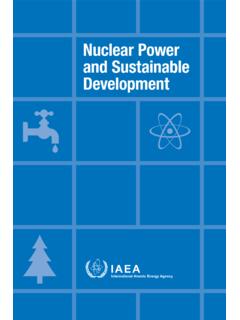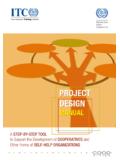Transcription of Economic Development in Africa Report 2017 - unctad.org
1 UNCTAD. U N I T E D N AT I O N S C O N F E R E N C E O N T R A D E A N D D E V E L O P M E N T. Tourism in terms of its contribution to gross domestic product, employment and trade is an important sector in many African economies, and its growth is Economic . increasingly driven by tourists originating from the continent itself. However, most Development IN. African countries still face significant challenges and constraints in exploiting the potential of tourism services in trade and Economic Development . The Economic Development in Africa Report 2017: Tourism for Transformative and Inclusive Growth examines the role that tourism can play in Africa 's Development process. Economic Development IN Africa Report 2017.
2 It identifies the main barriers to unlocking the potential of tourism in Africa to help structurally transform the continent's economy and provides policy recommendations on how to overcome them. In sum, tourism can be an engine for inclusive growth and a complement to Development strategies aimed at Report 2017. fostering Economic diversification and structural transformation within an appropriate policy context. Tourism On the occasion of the International Year of Sustainable Tourism for Development , this insightful and timely Report highlights the importance for Transformative of the tourism sector in Africa , and proposes clear policies on how and Inclusive Growth to better harness such potential and build a better and more inclusive future for Africa and its people.
3 Taleb Rifai, Secretary-General, World Tourism Organization This important Report on tourism, inclusive growth and regional integration is essential reading for policymakers, academics and tourism practitioners concerned with job creation and the future of Economic and social Development in Africa .. Christian M. Rogerson, Professor, School of Tourism and Hospitality, University of Johannesburg, South Africa Printed at united nations , Geneva ISBN 978-92-1-112910-6. 1700000 (E) April 2017 3,921. united nations . UNCTAD/ALDC/ Africa /2017. united nations publication Sales No. ISSN 1990-5114. For millions of Africans, tourism is a lifeline its potential for driving transformative and inclusive growth must be harnessed.
4 Mukhisa Kituyi Secretary-General, UNCTAD. U N I T E D N AT I O N S C O N F E R E N C E O N T R A D E A N D D E V E L O P M E N T. Economic Development in Africa Report 2017. Tourism for Transformative and Inclusive Growth New York and Geneva, 2017. Economic Development in Africa Report 2017. Note The designations employed and the presentation of the material do not imply the expression of any opinion on the part of the united nations concerning the legal status of any country, territory, city or area, or of authorities or concerning the delimitation of its frontiers or boundaries. The designation employed and the presentation of material on any map in this work do not imply the expression of any opinion whatsoever on the part of the united nations concerning the legal status of any country, territory, city or area or of its authorities, or concerning the delimitation of its frontiers or boundaries.
5 Any references to dollars ($) are to united States dollars. Material in this publication may be freely quoted or reprinted, but acknowledgement is requested, together with a copy of the publication containing the quotation or reprint to be sent to the UNCTAD secretariat. Regional classifications used in this Report Eastern Africa Burundi, Comoros, Djibouti, Eritrea, Ethiopia, Kenya, Madagascar, Malawi, Mauritius, Mozambique, Rwanda, Seychelles, Somalia, South Sudan, Uganda, united Republic of Tanzania, Zambia, Zimbabwe Middle Africa Angola, Cameroon, Central African Republic, Chad, Congo, Democratic Republic of the Congo, Equatorial Guinea, Gabon, Sao Tome and Principe Northern Africa Algeria, Egypt, Libya, Morocco, Sudan, Tunisia Southern Africa Botswana, Lesotho, Namibia, South Africa , Swaziland Western Africa Benin, Burkina Faso, Cabo Verde, C te d'Ivoire, Gambia, Ghana, Guinea, Guinea-Bissau, Liberia, Mali, Mauritania, Niger, Nigeria, Senegal.
6 Sierra Leone, Togo UNCTAD/ALDC/ Africa /2017. united nations Publication Sales No ISBN 978-92-1-112910-6. eISBN 978-92-1-060368-3. ISSN 1990-5114. ii Copyright united nations , 2017. All rights reserved Tourism for transformative and inclusive growth Acknowledgements The Economic Development in Africa Report 2017: Tourism for Transformative and Inclusive Growth was prepared by Junior Roy Davis (team leader), Jane Muthumbi, Claudia Roethlisberger and Olivia Shillabeer. The work was completed under the overall supervision of Paul Akiwumi, Director, Division for Africa , Least Developed Countries and Special Programmes. An ad hoc expert group meeting on tourism as a means of achieving transformative and inclusive growth was held in Geneva, Switzerland, on 19 and 20 January 2017 to conduct a peer review of the Report .
7 The meeting brought together specialists in African tourism and Economic Development . The following people participated in the meeting and contributed to the Report : Dirk Bezemer, Professor, Faculty of Economics and Business, Global Economics and Management, University of Groningen; Dale Honeck, Counsellor, Trade in Services and Investment Division, World Trade Organization; Andrew Mold, Officer-in-Charge and Geoffrey Manyara, Economic Affairs Officer, Subregional Office, Eastern Africa , Economic Commission for Africa ; Carmen Nibigira, Regional Coordinator, East Africa Tourism Platform; Christian Rogerson, Professor, School of Tourism and Hospitality, Faculty of Management, University of Johannesburg.
8 Ester Rubio, Integrated Trade Intelligence Portal Coordinator, World Trade Organization; Zoritsa Urosevic, Representative of the World Tourism Organization (UNWTO) to the united nations at Geneva; William Davis, Economic Affairs Officer, Economic Commission for Africa ; and Fai al Belaid, PhD student in international economics, Graduate Institute of International and Development Studies, Geneva. Members of the Economic Development in Africa Report team also attended the meeting. The following staff members took part in and/or made comments on the draft: Diana Barrowclough, Hassiba Benamara, Lisa Borgatti, Elissa Braunstein, Milasoa Cherel- Robson, Mussie Delelegn, Samuel Gayi, Martine Julsaint-Kidane, Nicole Moussa, Patrick Nwokedi Osakwe, Amelia Santos-Paulino, Carolina Quintana, Astrit Sulstarova, Antipas Touatam, Rolf Traeger, Giovanni Valensisi, Guillermo Valles, David Woodward, Frida Youssef, Anida Yupari and Simonetta Zarrilli.
9 Agn s Collardeau-Angleys provided statistical assistance; Stefanie West provided secretarial support; Sophie Combette designed the cover; Deniz Barki and Lucy D l ze-Black edited the Report ; and Madasamyraja Rajalingam, in collaboration with Nad ge Hadj mian, was responsible for the layout, graphics and desktop publishing. iii Tourism for transformative and inclusive growth Table of Contents Abbreviations ix Glossary x INTRODUCTION. Tourism for transformative and inclusive growth 1. CHAPTER 1. The tourism sector in Africa : Stylized facts 9. Definitions 11. Key characteristics of the tourism sector in Africa 12. Tourism in national Development plans 34. Mapping African tourism policy at the national level 34.
10 CHAPTER 2. Fostering structural transformation through tourism 39. Structural transformation and the growth of tourism 41. The role of intersectoral linkages in structural transformation 43. Linkages and their importance 44. Value addition in the tourism value chain 45. Strengthening intersectoral linkages 56. Developing key tourism market segments 63. Conclusions 75. CHAPTER 3. Tourism and inclusive growth 79. Vulnerability and inclusive growth 81. Tourism and poverty alleviation 82. Youth and tourism 85. Youth and employment 85. Enabling youth to participate in the tourism sector 88. Women, gender and tourism 89. Role of women and gender in African tourism policies 89. Female labour participation in tourism 89.
